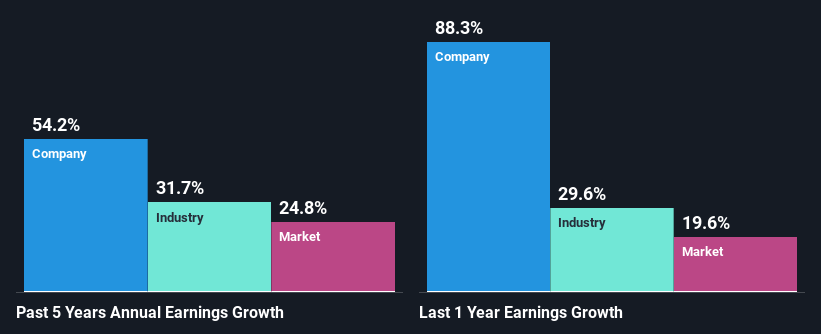- India
- /
- Electrical
- /
- NSEI:DPEL
Is Divine Power Energy Limited's (NSE:DPEL) Latest Stock Performance A Reflection Of Its Financial Health?

Divine Power Energy (NSE:DPEL) has had a great run on the share market with its stock up by a significant 60% over the last month. Given that the market rewards strong financials in the long-term, we wonder if that is the case in this instance. In this article, we decided to focus on Divine Power Energy's ROE.
Return on equity or ROE is a key measure used to assess how efficiently a company's management is utilizing the company's capital. In other words, it is a profitability ratio which measures the rate of return on the capital provided by the company's shareholders.
How Is ROE Calculated?
ROE can be calculated by using the formula:
Return on Equity = Net Profit (from continuing operations) ÷ Shareholders' Equity
So, based on the above formula, the ROE for Divine Power Energy is:
17% = ₹87m ÷ ₹518m (Based on the trailing twelve months to September 2024).
The 'return' refers to a company's earnings over the last year. So, this means that for every ₹1 of its shareholder's investments, the company generates a profit of ₹0.17.
Check out our latest analysis for Divine Power Energy
What Has ROE Got To Do With Earnings Growth?
Thus far, we have learned that ROE measures how efficiently a company is generating its profits. Depending on how much of these profits the company reinvests or "retains", and how effectively it does so, we are then able to assess a company’s earnings growth potential. Assuming all else is equal, companies that have both a higher return on equity and higher profit retention are usually the ones that have a higher growth rate when compared to companies that don't have the same features.
Divine Power Energy's Earnings Growth And 17% ROE
At first glance, Divine Power Energy seems to have a decent ROE. And on comparing with the industry, we found that the the average industry ROE is similar at 15%. This certainly adds some context to Divine Power Energy's exceptional 54% net income growth seen over the past five years. We reckon that there could also be other factors at play here. For example, it is possible that the company's management has made some good strategic decisions, or that the company has a low payout ratio.
As a next step, we compared Divine Power Energy's net income growth with the industry, and pleasingly, we found that the growth seen by the company is higher than the average industry growth of 32%.

Earnings growth is a huge factor in stock valuation. The investor should try to establish if the expected growth or decline in earnings, whichever the case may be, is priced in. Doing so will help them establish if the stock's future looks promising or ominous. Is Divine Power Energy fairly valued compared to other companies? These 3 valuation measures might help you decide.
Is Divine Power Energy Using Its Retained Earnings Effectively?
Divine Power Energy doesn't pay any regular dividends to its shareholders, meaning that the company has been reinvesting all of its profits into the business. This is likely what's driving the high earnings growth number discussed above.
Conclusion
Overall, we are quite pleased with Divine Power Energy's performance. Particularly, we like that the company is reinvesting heavily into its business, and at a high rate of return. Unsurprisingly, this has led to an impressive earnings growth. If the company continues to grow its earnings the way it has, that could have a positive impact on its share price given how earnings per share influence long-term share prices. Let's not forget, business risk is also one of the factors that affects the price of the stock. So this is also an important area that investors need to pay attention to before making a decision on any business. To know the 4 risks we have identified for Divine Power Energy visit our risks dashboard for free.
New: Manage All Your Stock Portfolios in One Place
We've created the ultimate portfolio companion for stock investors, and it's free.
• Connect an unlimited number of Portfolios and see your total in one currency
• Be alerted to new Warning Signs or Risks via email or mobile
• Track the Fair Value of your stocks
Have feedback on this article? Concerned about the content? Get in touch with us directly. Alternatively, email editorial-team (at) simplywallst.com.
This article by Simply Wall St is general in nature. We provide commentary based on historical data and analyst forecasts only using an unbiased methodology and our articles are not intended to be financial advice. It does not constitute a recommendation to buy or sell any stock, and does not take account of your objectives, or your financial situation. We aim to bring you long-term focused analysis driven by fundamental data. Note that our analysis may not factor in the latest price-sensitive company announcements or qualitative material. Simply Wall St has no position in any stocks mentioned.
About NSEI:DPEL
Divine Power Energy
Manufactures and sells insulated and bare copper and aluminum wires and strips in India.
Proven track record slight.
Similar Companies
Market Insights
Community Narratives



